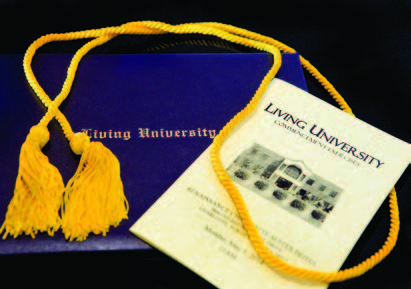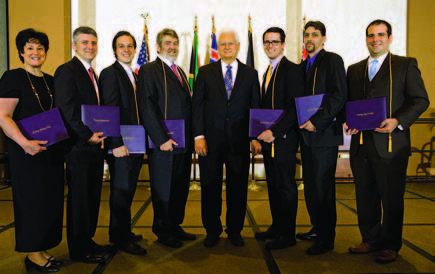As Living University begins its eighth year of operations, we are keenly aware that many have questions about the University, its academic programs, and on-site study in Charlotte, North Carolina. So, we would like to answer some of the most commonly asked questions about Living University. For more detailed answers, and for further information, be sure to visit us online at www.livinguniv.com. Our online catalog is available for download and is full of useful information. You can also e-mail or call us at [email protected] or (704) 708-2294.
“Who can take Living University classes?”
Answer: The short answer is “just about anyone” as long as you have computer and Internet access. Our students have ranged in age from 15 to their early 90s.
“How do I get started?”
Answer: First, visit www.livinguniv.com. Click the “Become an LU Student: Apply Now” button and start the application process. There are a number of types of enrollment, including the pursuit of certificates, diplomas and degrees, but the easiest and quickest way to start is to enroll in the Open Learning Program. Enrolling through this program will allow you to audit or take up to 24 semester-hours of credit without formally choosing a certificate or degree program. Only 15 hours of previously completed credit can be applied to a certificate program. Early registration for the Spring/Semester II 2015 semester begins on November 10, 2014, and classes start on January 14, 2015.
“When do classes meet?”
Answer: Because we are online and serve time zones around the globe, our learning method is “asynchronous.” This means that you can log in and study, submit papers, and listen to lectures anytime day or night—as long as you submit your assignments by their due dates.
“How much time should I plan to spend in my studies each week?”
Answer: For a three-credit class (in other words, for most of the classes we offer), we recommend that you plan to devote about 10 hours per week, though this will vary depending on how quickly you read and how well you write. If you are auditing, it will generally take you 5–7 hours a week, depending on your reading speed.
“Can I benefit from Living University without having to worry about quizzes, exams and papers?”
Answer: Yes! Through the “audit” option, you can register for a course, listen to the lectures and read the course materials—you will receive full access to the class you choose to take. However, by auditing a course you will not need to worry about completing and submitting assignments or studying for exams. This option does require a tuition payment unless you are age 65 or above, and you also need to purchase and read from the required textbooks.
“Why should I take Living University courses if I am already a long-time Church member? What do I stand to learn?”
Answer: That is a very good question! Long-time members possess a great deal of knowledge and understanding and are often excited about learning even more. Living University classes address the Bible and related topics from a very detailed perspective, providing a great deal of background information and study not typically available via regular Sabbath sermons and Bible studies. Many long-time members completing our theology courses tell us how surprised they were to have learned so much about Bible topics they “thought” they completely understood before. Our highly trained and time-tested faculty members are skilled in helping students come to deeper biblical understanding. For those who desire to continue learning and growing in Bible knowledge and understanding, Living University provides an unmatched opportunity for in-depth learning.
“Should I take a Living University course even though I am enrolled in another university?”
Answer: Yes! This is a great idea! You will learn a great deal through your coursework from other universities. However, what is one area that you will be missing? Biblical understanding or theology. Consider taking a Living University course, even just once a year, to balance out your other university coursework. Living University can provide you with the important “missing dimension in knowledge” that is lacking in a typical education. It will also help you build a more solid foundation and grounding in God’s truth.
“Does Living University offer classes on topics other than theology?”
Answer: Yes! Although our strong point is definitely our understanding of the Bible, and most of our classes do focus on theology, we also offer courses in English and writing, health, communication and speech, working with youth, math, business, education and archaeology. We offer certificates in Christian Family Studies and Archaeology and plan to offer them in Business and Communication. All of our courses, however, take a unique biblical approach to the subject area.
“Why should I consider on-site study?”
Answer: On-site students still take their courses online, but they also benefit from weekly, in-person discussion sections with most of their professors. They participate in a weekly faculty/student Assembly with different presenters. They participate in student extracurricular activities and field trips. They typically serve in student work-study positions within a department of God’s Work. They get to know and serve with the leadership at the international headquarters of God’s Work. And, they participate in the many and varied activities of the Charlotte, North Carolina congregation along with its 250+ attendees. The on-site study option offers an even richer learning environment and opportunity to recapture even more “true values” than the online experience. It also offers the privilege of being part of the headquarters experience. Until we become accredited, however, this option is only open to United States citizens. We plan to increase the size of our on-site program as funds and donations allow us to grow, procure more student residence space, and greater library and classroom space—ultimately, we plan to grow as God allows.
“Do I need to be an on-site student for four years?”
Answer: No! Some of our students do plan to stay for four years and complete a bachelor’s degree. Others, however, plan to come for only a year or two. Some plan to come for a year and end up staying longer. Whatever your plans, many have found the on-site experience to be very much worthwhile.
“What if I plan to go to college elsewhere? Wouldn’t Living University be a waste of my time?”
Answer: Great question! The short answer is that building your spiritual foundation and decreasing your likelihood of being deceived can never be a waste of your time. In addition, in this age of high unemployment, where many college graduates and other young people are competing against those with real-life experience, taking a year or two to attend LU will help you develop that much more emotional and spiritual maturity. It will also help you develop more confidence, and even enrich your public speaking and interpersonal skills—which all employers desire, but that most are seeing less and less of. By adding a year or two of Living University maturity and skills to your resume, you will make yourself that much more marketable to future employers.
“Why do I need to go to Living University if my ambition is to be a wife and mother?”
Answer: Choosing to be a wife and a mother—one of the most important decisions any young woman can make—is ultimately a “career choice,” even though Satan’s world teaches otherwise. Mothers are a primary spiritual teacher for their children, and education and preparation are important keys to success in any career. Thus, any wise woman will benefit from the opportunity to become more firmly grounded in the truth. The Living University curriculum was designed to develop a whole host of abilities that will be valuable to the wife and mother who will manage a home and rear children in God’s Way. It is an ideal way for a wife and mother to prepare for her future role!
“Will classes I take at Living University transfer to other universities?”
Answer: That depends. Although the University is not yet accredited, we have had limited success with some classes transferring as “elective credit” to an accredited institution. Right now, it is up to the institution. One of the reasons we are developing an Associate of Arts (AA) degree is to increase transferability of LU credits. Once the state of North Carolina licenses the AA degree, this should increase the transferability of our classes. Then, when our programs become accredited (two to three years from now, God willing), that transferability will be enhanced still further. Transferability is always a case-by-case situation—which has so far worked in favor of Living University students.
“Is Living University accredited?”
Answer: Not yet. We are currently working on an application for national accreditation through the Distance Education and Training Council. This is a two-step process that should take two to three years with God’s help.
“What are the benefits of accreditation?”
Answer: Accreditation is a process designed to benefit the students. It assures students that the University will continue throughout their degree program and verifies that a quality education and quality teaching are in place. Accreditation will not dictate what we can or cannot teach in our theology classes. The following are benefits that our students can expect from accreditation: a) increased transferability of LU courses to other institutions, b) improved acceptability to graduate programs, c) improved employability of LU graduates, d) ability for international students to pursue on-campus study, e) donation-matching from some employers (some employers will match 100 percent of donations employees make to an accredited institution) f) use of federal grant and scholarship programs for Living University study (e.g., Pell Grants).